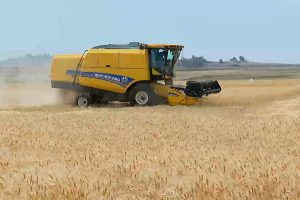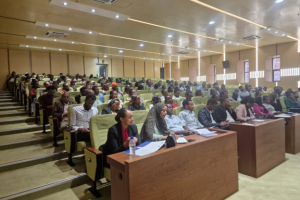
Fayiza Shemsu, lecturer of Material Engineering in Jimma University. She is the winner of the Biruh Ethiopia’s Entrepreneurship Idea Competition. The following is her stay with the Ethiopian Press Agency (EPA) where she talked about her experience and life journey.
Fayiza was born in Gurage Zone and raised in Addis Ababa. She attended her primary and secondary education in different schools in Addis Ababa. After accomplishing her preparatory education in Addis Ketema School, she then joined Adama Science and Technology University.
Her passion for chemistry did not allow her to join any other field but material engineering. Unlike other students who feared joining the department, for it was newly opened and considered as the toughest, she did not want to think twice to join the department. Using her passion as an engine to achieve her goal, Fayiza was able to fulfill her educational pursuit.
Right after her graduation, she was hired by the university as a lecturer. In the next year, the university offered her an opportunity to further her education, and she was able to hold her Master’s degree in the same field and kept on lecturing her pupils.
As a lecturer, she used to advise her students to give due attention to their research paper so that it would be useful in curbing problems in the society. Using her experiences together with the books she read, Fayiza used to inspire her students to be practical rather than mere readers. This is especially true for those female students that have a vision to achieve their goals despite the hurdles life set before them. “That’s why I developed the habit of showing my students videos during my lecture to positively influence them in this regard.”
“Despite the promising achievements that have been made by the government, a lot of work is needed to enhance women empowerment especially in technology and science fields. Creating an enabling environment and opportunity to female students should be the major priority in the country. Women are innovative and critical thinkers naturally. So, they need to withstand the challenges they face in various fronts.”
The fact that she has deep affection for research, Fayiza has conducted different studies while she teaches in the university. She believes that researches should not be left on the shelves rather they need to be implemented and make an impact to solve challenges faced by the country. With this in mind, her research papers are written focusing to alleviate socio-economic challenges of the country.
One of her researches which is centered on producing bricks made out of charcoal is a good indication how Fayiza has a concern for the construction sector which is consuming a great amount of cement. She noted that used charcoal has same properties just like cement. Thus, rather than disposing of the ash and damaging the environment, the charcoal could be reused to produce clay bricks. She also said, the good thing about clay bricks is that, if it gets cracked, it has the capacity to repair using moisture.
The other innovation Fayiza was able to introduce to the society is sanitary pad which is made out of false banana and this innovation enabled her to win Biruh Ethiopia’s Entrepreneurship Idea Competition, which envisions identifying the underlying challenges of the society. According to her, the certificate and the financial award she earned from Biruh Ethiopia has added her an inspiration and pushed her further to make her other researches a reality.
When asked how the idea of making sanitary pads out of false bananas came into her mind Fayiza said that the experience she once had in Uganda while attending a conference with a group of women drawn from Uganda and American students had inspired her to produce sanitary pads which are environmentally friendly and reasonable in price. While attending the conference in Uganda Fayiza`s mind was wandering around to look for every possible solution that can help her producing the pad out of false bananas.
When she returned to Ethiopia, she realized that the idea could not be implemented as planned. However, this did not discourage her from exerting her energy and knowledge. While immersing herself in research, she also considered that most rural Ethiopian women use false banana during labor or menstruation. As a little girl, Fayiza had the opportunity to witness many women, especially those giving birth, using Enset, or ‘false banana’.
The false banana tree has a significant capacity for holding water for an extended period, as does the soft part of the branch. Therefore, once she confirmed that Enset-False banana was commonly used among Gurage women, she decided to proceed with her research. After extensive research and experimentation, Fayiza developed a women’s pad using the plant, which ultimately led her to win the prize of 260,000 ETB in the Biruh Ethiopia’s Entrepreneurship Idea Competition in 2023.
Mentioning that she tried to check on other pads that are on the market, she said most of the pads were made of plastic which are harmful to human body. Moreover, the plastic has the tendency to become burning and irritating during warm seasons.
Not only that the majority of the materials that are imported from different countries are getting more expensive, but the fact that it takes many years to decay could potentially harm the environment. On the other hand, pads that are made from false bananas are environment friendly as they are made from biomass. Moreover, they are affordable and could easily decay.
Fayiza was not satisfied with the pad that was made of the false banana and she tried to come up with reusable pads to support those who could not afford to buy the one on the market. Therefore, she started manufacturing the reusable pad in her house.
However, the response was a bit disappointing as most women in the capital do not use the reusable pads. Though she planned to reach women in the rural areas, she found it difficult because she did not have governmental or non-governmental institutions to work with.
“My plan was to reach out to the women in the states and mostly in the rural area as they are the one who face the major challenge when it comes to accessibility of pads be it reusable or the usual one.”
She said she would welcome any institutions that are ready to work with her. Likewise, she urged concerned institutions to provide her with working area so that she could broadly engage in the business and address women’s pressing challenges. With regard to the reusable pads, she highlighted that a charity organization could join hand with her to distribute the pads in remote areas.
BY BETELHEM BEDLU
THE ETHIOPIAN HERALD THURSDAY 28 MARCH 2024




